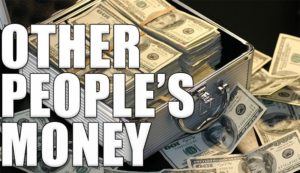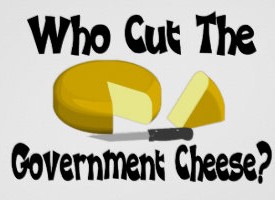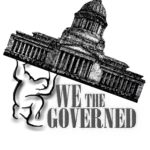
TO RECEIVE THE LATEST NEWS FROM WE THE GOVERNED DELIVERED STRAIGHT TO YOUR INBOX –SUBSCRIBE HERE
Support We the Governed – MAKE A DONATION HERE

In Washington State, like all other states, extreme budget cuts are coming very quickly. There is no way to avoid them. Tax receipts are collapsing, which is what happens when you essentially shut down the national economy for shelter-in-place lockdowns months at a time. Unlike the Federal Government, states and local governments can’t print their own money out of thin air. However, these sudden cuts will produce a series of predictable actions which bureaucrats will take to fight the inevitable cuts coming their way. I detail the top six games bureaucrats will play in the following video:
However, if you prefer to read about this in more detail, we’ll explain the logic and predictability behind these games, focusing on Washington State as our local example. This will be happening in all 50 states over the next few months and years, and the same actions will be occurring at a local (city and county) level as well.
First Stage – Denial

Under normal circumstances, the denial phase would last many months and even years before this game is up. However, due to the sudden and extreme nature of the shut-down orders, spike in unemployment claims, combined with crashing economic indicators, this stage will be short-lived and is probably vanishing already in most quarters of government. Nevertheless, it is worth addressing.

As we’ve already discussed, a substantial percentage (roughly 70%) of Washington State’s tax receipts come from sales tax, B&O tax, and special excise taxes – all of which are directly reduced by the current economic downward spiral in the state. The increased grocery spending has zero tax benefit since most food purchases are not taxed. Shelter in place collapses economic growth and distorts the economic numbers in a way never seen before in modern times. Massive job losses make it worse (and increase local government costs due to unemployment, etc.). Even when the shelter-in-place order is lifted, not too many people will be flocking to movies, taking cruises, planning their dream vacation, or eating out three nights a week. Essentially, these government orders have turned everyone into a prepper and home schooler overnight, plus a lot of Americans just bought their first firearms. The world has changed. It is going to take years before we see spending (and tax receipts) get to the pre-Wuhan/Corona Virus level. Many small businesses are not coming back. The only question yet to be answered is how large this drop in tax collection will become.

Roughly, the state’s biennial budget is about $55 billion right now, which is an annual budget of about $27.5 billion. While it is impossible to predict the tax collection collapse, it is massive and larger than any drop anyone has seen before. Even Governor Jay Inslee, who habitually and instinctively squanders tax dollars like they are fake Monopoly cash, made some spending line item vetoes (of about $500 million) in the budget recently passed by the legislature a few weeks ago. The Rainy Day Fund which was mostly created, defended, and promoted by the Republicans and had been raided by the politicians, is officially gone – $1.6 billion (roughly) is vanishing as you read this sentence. Federal Grants? Sure, just like all the other states. Billions, I am sure. It won’t matter, and it won’t be enough – it is already spent.
Second Play – OPM – Let’s use other People’s Money

This is the reflexive choice of the bureaucrat and the special interests who thrive on government cash. Normally, this works well. It doesn’t work out great for the taxpayer, but the bureaucrat and their cronies get to live well on the hard work and cash from others. This phase is probably being planned as you read this article. To avoid cuts or even slow-down the bloat, the bureaucracy will do anything, say anything, and excuse anything to get more tax dollars. Government is good at very few things. Finding unlimited excuses and methods for new taxes happens to be the one category in which government excels.
The challenge this time around is the fact that the general public is in no appetite to pay higher taxes. In fact, there was already a growing tax revolt in Washington State against the recently increased property taxes, a total repudiation in last November’s election of the excessive car tab fees, and a growing anger at the effort to impose a state income tax. The current economic free-fall creates a climate where most voters will respond with anger and derision at any politician stupid enough to take this road. Sure, the Seattle Socialist crew will blandish their “tax the rich” slogans, but nobody is listening to them, and everyone is paying too much already. The tax gravy train is not leaving the station right now.
Third Angle – Live High Today – Make Our Kids Pay Tomorrow

This is essentially the push to go into debt to keep the government bloat alive today and shift the cost to future generations. After all, interest rates are as low as they can get, right? Democrat State Senator Hobbs will probably float this one, and he won’t be alone. This is the equivalent of a regular person racking up credit card bills to pay their daily expenses and they hope someone will bail them out tomorrow. For the state, that someone will be our kids. This is a terrible plan, and beyond the morally questionable aspects, there isn’t enough bonding capacity (or appetite in the bonding marketplace) to make this a viable option.
There might be some confusion on this point, because the Federal Government has obviously done essentially this for decades to keep the bureaucracy and special interest gravy train going for decades. However, at the state level, this is not possible. The states which have taken this path already – California, Illinois, New Jersey, etc are about to experience complete fiscal disaster and insolvency on a scale not seen in America before. It is not the road Washington State can or should take, and while the bureaucrats may clamor for it once they realize the magnitude of the cuts which are coming, this should be a short-lived phase, which passes like a bad nightmare.
Fourth Stage – Punish the Taxpayer, make the people suffer

This is a particularly nasty game that the bureaucracy always plays, and they are experts at the narrative. From their perspective – “ok you skinflint taxpayers, you won’t keep giving us all your money? See how you like this.” They will then make absurd, first line budget cuts like releasing and unleashing sex-offenders and violent criminals on the community, so the bureaucrats can plead poverty as the excuse for not doing their job. They will close parks and cut back on even near-zero cost expenditures for services and programs which are popular and used by the community. All this, in an effort to gin up support for more taxes or more taxpayer cash.

This game is played often because it works, and it takes serious budget analysis and a deeper than average understanding of government budgeting in order for the public to realize that there were 100 programs, unseen and unnoticed and uncared about by the public which could have been cut first, but they employ a lot of political insiders and special interests love them. The government bureaucracy WILL NEVER willingly cut THOSE programs first because once cut, they may never come back again. These are the programs that have grown in darkness, bloated over the decades, and utilized skillful lobbyists, and careful political negotiations to create. They often have zero practical value to the community, but they carry strong political weight. So, it is better to block off access to the parks, shut down the campgrounds, release sex offenders, and stop issuing permits to the public. THOSE things the general public actually use and they might care enough about them. The bureaucrats believe they can convince the public to impoverish themselves a bit more to keep the bureaucratic game going.

This will be the game which must be confronted by the public and those politicians who have an eye on the budget and a willingness to confront the bureaucracy. This will start happening by early next year if not sooner, and it will take exceptional political leadership and publicity to prevent it from becoming policy.
Fifth Game – “Across the Board Cuts”
Essentially, this is when the Governor and Legislature knows they have a budget shortfall of 10%, so they say they will make an “across the board 10% budget cut.” This is actually just another version of the “Punish the Taxpayer” game, but it is based on the logical fallacy that all government programs are equal. Lazy politicians like this game, because they can close budget shortfalls without doing the difficult work to dig into the labyrinth of the bureaucracy and make programmatic cuts.
Senior political appointees and upper management also prefer this option because they are typically given the latitude to cut front-line staff (who often actually do real work) and keep their own bureaucratic nest feathered. This is how you have departments where there are more managers than workers. This creates absurd scenarios where an agency will lay off all the janitors and the receptionist, but not one person in upper management, despite the fact that upper manager has a taxpayer cost in excess of all the front line staff, and the agency could still do their statutory job without the upper manager.
The Sixth Phase – “Hunger Games in State Government”
Due to the sudden extreme collapse in tax revenue, the unlikelihood of any solutions without major cuts, and the fact that these other bureaucratic games probably won’t work this time, this is the phase I expect state government to enter by early next year. Essentially, this is a game of musical chairs, and the music has stopped. The bureaucrats will have to fight each other for the few tax dollar chairs left, and they will have to fight to the bureaucratic death to have a seat. Oddly enough, this is the phase which has the potential of doing the least harm, and possibly even some good.

If there is one group of people who know where the bodies are buried in state government and who know which programs are scams and failures more than anyone else – it is other bureaucrats. When they see the bad programs surviving the initial wave of budget cuts, and they realize they are on the chopping block next, their reluctance to expose the truth will fade away. There will be nothing left to lose. The long knives will come out and they will start stabbing each other in the back to keep their turf alive. It might be ugly and there inevitably will be bad choices made during this time, but this is when a lot of dead wood and programmatic cuts can be made. The smarter and craftier bureaucrats already see this coming, and they are preparing. The arrogant and politically connected are calling in favors and preparing for the siege.
However, regardless of what games the bureaucracy plays, the cuts are coming and it will be up to the taxpayers, fiscally prudent politicians, activists, and what is left of the media to keep their attention focused on the priorities of government. We must retain only what government services are truly critical at this stage to weather the economic blizzard, avoid doing more harm, and help average people get back on their feet. This might take a while.

OUR CONSTITUTION BEGINS WITH THE PHRASE “WE THE PEOPLE.” IT WAS THE FOUNDER’S INTENT THAT GOVERNMENT BE CREATED BY THE PEOPLE, TO SERVE THE PEOPLE. IT WASN’T THEIR INTENTION FOR THE PEOPLE TO SERVE THE GOVERNMENT. IT WAS ALWAYS INTENDED THAT GOVERNMENT WHICH FAILED TO SERVE THE PEOPLE SHOULD BE “ALTERED OR ABOLISHED.” UNTIL WE RETURN TO THE FOUNDER’S INTENT, WE REMAIN WE THE GOVERNED…
Background articles and documents:
Pew Research – “We have no money” Coronavirus slams state taxes
Time to Downsize State Government
Many Counties delay due date for property taxes – this is just the beginning







